#THIS IS NO MAGAZINE GET OUT
Explore tagged Tumblr posts
Text
WHY IS THERE ADS INSIDE MANGA NOW 😭
What in capitalism is this..
#dunkar rant#I haven't bought anything in years#What is this#Tbf it's for the website of the publisher#BUT WHY#INSIDE THE DAMN THING#BRO#THIS IS NO MAGAZINE GET OUT
4 notes
·
View notes
Text
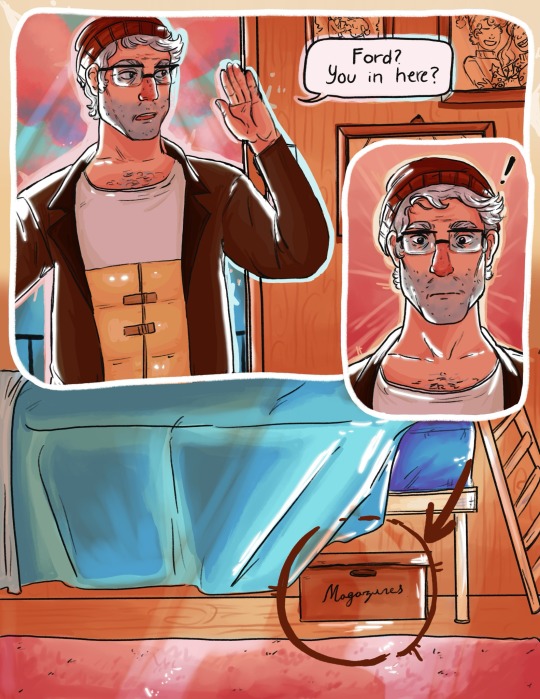
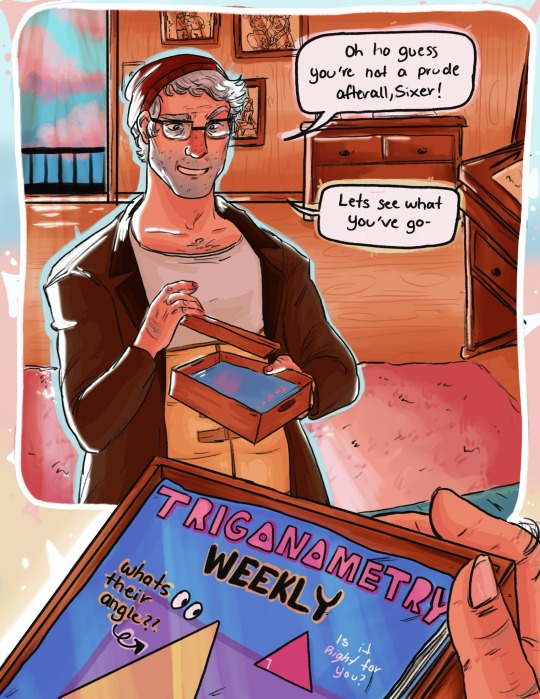
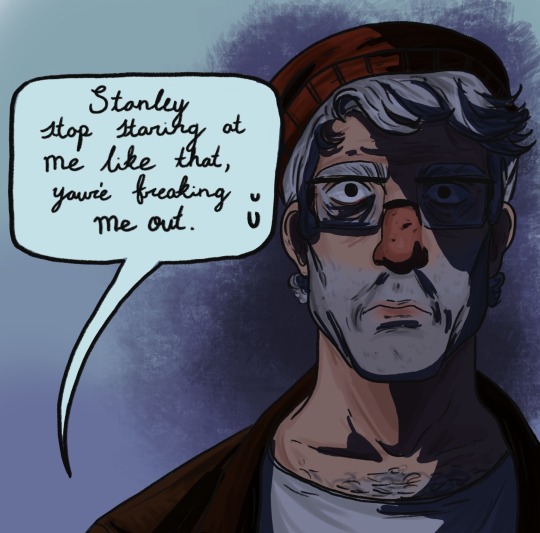
The worst trauma comes from those who you love
#gravity falls#book of bill#ford pines#stanford pines#bill cipher#billford#stanley pines#stan pines#grunkle Stan#the pines twins#tw stan#genuially was hard drawing that last panel cause it kept freaking me out#ptsd guy meme#No ford did not jork it he’s just a nerd who gets nerd magazines#based off those pop teen magazines from the 2000s#sea grunkles#yeah this joke has been beat to death but idc#comic practice#I fucked up which hand was holding the box oops#uhhh ignore that#trigonometry is a ridiculously hard word to fit onto anything#‘that’s not a right angle’ YOUR MOMS NOT A RIGHT ANGLE#it was in fact NOT right for him#get it
23K notes
·
View notes
Text

ummm so have y’all seen that GQ photo shoot…?
this is sort of a joke for @bluelotuswrites fic The Hellblazer’s Apprentice on a fun way for bruce to find out jason is in fact alive and well. it’s also just an excuse to draw all blades jason shirtless bc i’m a hoe 😔
edit: now with fic!!! please go check out blues fun fic about model jason!
#bruce finding out jason’s alive because he passed a billboard with jason shirtless and posed like a model#he has to take a week off to process#everyone in gotham is thirsting over his undead son there are screens with the photo shoot up like it’s times square#bruce cannot escape it#dick is mortified when his friends buy the magazine#damian is horrified to see his brother from the league presenting himself in such a way but glad to know he’s okay#everyone is scarred for life#meanwhile#constantine is laughing his ass off in a corner after having scored jason the gig in the first place to get back at bruce after a mission#jason todd#jason todd fanart#batfam#fic: the hellblazer’s apprentice#GQ magazine#john constantine#bruce wayne#my art <3#my art
2K notes
·
View notes
Text

Studio Magazine #2 ft. the bday boy ♡
[10/10] Cross from xtaleunderverse by jakei95
#zu art#cross!sans#birthday#studio#zudio#backstage#undertale#undertale au#utmv#I completely forgot about this thing with covers they were supposed to come out every month :'D (Epic is the next one? ;3)#got carried away watching magazines heh (men... s so pretty... ///)#oxytocin levels have been elevated! (๑˃̵ᴗ˂̵)♪#back to work heheh#I wonder if he requires a driver's license cause I'd definitely r— *gets bonk*
577 notes
·
View notes
Text
Easy to forget that Jaal IS living his fantasy of "hot aliens come knocking at your door to whisk you away on space adventures in their technologically advanced alien ship"
Like we're the aliens this time around, coming to his home planet, getting him on a spaceship with a variety of hot aliens. In a single day, Jaal's life took a turn for the harem anime protagonist road.
This is a full on monsterfucking fetish to him, we are the monsters he wants to fuck.
And he's an alien enthusiast. He was writing "alien x reader" on angaran Wattpad since he was a teen.

#good thing he was born during first contact when it was socially acceptable for him to be as weird about aliens as his heart desires#because imagine if he was born during the peaceful “everyone gets along” modern world where angara have already assimilated#He'd have this mystery urge to seek non-angara out and not know why or what to do with it#like an autistic person before the invention of trains#Kinda ironic since I don't care much for trains ^#Either way instead of a cool and brave risk-taker who paved the path for the first joint cooperation between angara and aliens#he'd be a nerd hyperfixted on human magazines for some reason he can't decipher#mass effect#jaal ama darav#☆jaal#☆character specific#☆memes#☆Andromeda#☆alienfucker jaal
300 notes
·
View notes
Text

rockin’ out!!
#reposting old spring fest art lmao#i don’t really like how this turned out but i spent too much time on it haha#anyways#i bought a copy of a nintendo power magazine from 1998#it is so cool i love it#they had a bunch of pages on banjo-kazooie#a lot more too but i could rant for a while haha#i won’t though#i’ve got work to get to!#that’s why todays a repost#anyways have a great day :)#art#fanart#froggtogs#splatoon#off the hook#off the hook marina#off the hook pearl#oth marina#oth pearl#pearl oth#marina off the hook#pearl houzuki#marina#pearl#off the hook fanart#oth fanart#splatoon fanart#splatoon 3#pearlina
384 notes
·
View notes
Text
“ball” - Jegulus microfic - @into-the-jeggyverse - 305 words
Regulus is sitting on the couch with one foot tucked under him and James’ feet in his lap and he’s absentmindedly playing with the hem of James’ joggers. He’s reading a fascinating book Pandora got him about the interconnection between Greek philosophy and mythology; James is reading a magazine that Regulus has never heard of. Regulus is getting lost in the moment until he hears Sirius snickering from across the room, he tries to ignore it, but Sirius doesn’t stop.
“What?” Regulus looks up, annoyed.
“You guys are the literal embodiment of ‘you know how to ball, I know Aristotle’.” Sirius chuckles.
“Did you just compare us to a Taylor Swift lyric?” Regulus raises an eyebrow.
“I mean…” Sirius gestures between Regulus and James.
“You mean what?” Regulus narrows his eyes.
“What are you reading?” Sirius asks instead of answering.
Regulus reluctantly looks at his book about Greek philosophy then just glares at Sirius who cackles in response. “So? James is also reading?” Regulus tries to justify.
“James, what are you reading?” Sirius asks.
Regulus looks at James who’s trying very hard not to giggle when he says, “FourFourTwo.”
“I don’t even know what that is.”
“It’s my football magazine, love.” James tells him with a chuckle.
“Face it, Reggie. Your relationship is a walking, talking Taylor song.” Sirius leans back with a smug smile.
Before Regulus can respond, Barty and Evan walk in the living room and throw themselves on the other couch. “Hey, Sirius? You want to play video games with me and Ev?” Barty asks, unaware of the current conversation.
James and Sirius look at each other and burst out laughing.
“Oh, for fuck’s sake.” Regulus mumbles and rolls his eyes.
“What?” Barty looks between the three of them.
“It’s Taylor’s world, Barty. We’re just living in it.” Sirius tells him.
“Well, obviously.” Barty rolls his eyes.
#i've been listening to ttpd on repeat#i couldn’t get the line out of my head when i saw the prompt#and i love writing cheesy references#they are all swifties#you cannot change my mind#jegulus is very much a taylor song#but sirius has no room to talk#because so is wolfstar#brit-pick: is fourfourtwo a popular magazine?#i looked it up and it seems to be a fairly popular football magazine#regulus loves james#james loves regulus#jegulus#jegulus microfic#jegulus fanfiction#marauders fanfiction#regulus black#james potter#marauders#james x regulus#regulus x james#marauders era#harry potter marauders#harry potter#hp marauders#dead gay wizards from the 70s#dead gay wizards#starchaser#sunseeker#jeggyverse microfic
281 notes
·
View notes
Text
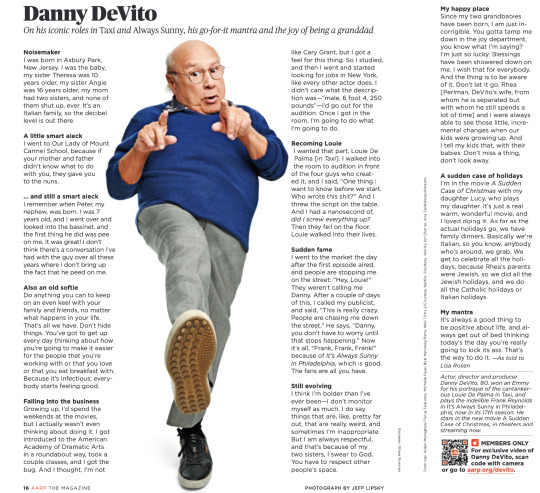
Danny did a little interview for AARP Magazine in December. I haven't seen it copied anywhere past the paywall and I enjoyed reading it, so wanted to repost here
(Article is pasted as text below the cut)
Noisemaker I was born in Asbury Park, New Jersey. I was the baby, my sister Theresa was 10 years older, my sister Angie was 16 years older, my mom had two sisters, and none of them shut up, ever. It’s an Italian family, so the decibel level is out there. A little smart aleck I went to Our Lady of Mount Carmel School, because if your mother and father didn’t know what to do with you, they gave you to the nuns. … and still a smart aleck I remember when Peter, my nephew, was born. I was 7 years old, and I went over and looked into the bassinet, and the first thing he did was pee on me. It was great! I don’t think there’s a conversation I’ve had with the guy over all these years where I don’t bring up the fact that he peed on me. Also an old softie Do anything you can to keep on an even keel with your family and friends, no matter what happens in your life. That’s all we have. Don’t hide things. You’ve got to get up every day thinking about how you’re going to make it easier for the people that you’re working with or that you love or that you eat breakfast with. Because it’s infectious; everybody starts feeling good. Falling into the business Growing up, I’d spend the weekends at the movies, but I actually wasn’t even thinking about doing it. I got introduced to the American Academy of Dramatic Arts in a roundabout way, took a couple classes, and I got the bug. And I thought, I’m not like Cary Grant, but I got a feel for this thing. So I studied, and then I went and started looking for jobs in New York, like every other actor does. I didn’t care what the description was—“male, 6 foot 4, 250 pounds”—I’d go out for the audition. Once I got in the room, I’m going to do what I’m going to do. Becoming Louie I wanted that part, Louie DePalma [in Taxi]. I walked into the room to audition in front of the four guys who created it, and I said, “One thing I want to know before we start. Who wrote this shit?” And I threw the script on the table. And I had a nanosecond of, did I screw everything up? Then they fell on the floor. Louie walked into their lives. Sudden fame I went to the market the day after the first episode aired, and people are stopping me on the street: “Hey, Louie!” They weren’t calling me Danny. After a couple of days of this, I called my publicist, and said, “This is really crazy. People are chasing me down the street.” He says, “Danny, you don’t have to worry until that stops happening.” Now it’s all, “Frank, Frank, Frank!” because of It’s Always Sunny in Philadelphia, which is good. The fans are all you have. Still evolving I think I’m bolder than I’ve ever been—I don’t monitor myself as much. I do say things that are, like, pretty far out, that are really weird, and sometimes I’m inappropriate. But I am always respectful, and that’s because of my two sisters, I swear to God. You have to respect other people’s space.
My happy place Since my two grandbabies have been born, I am just in- corrigible. You gotta tamp me down in the joy department, you know what I’m saying? I’m just so lucky. Blessings have been showered down on me. I wish that for everybody.And the thing is to be aware of it. Don’t let it go. Rhea [Perlman, DeVito’s wife, from whom he is separated but with whom he still spends a lot of time] and I were always able to see those little, incremental changes when our kids were growing up. And I tell my kids that, with their babies: Don’t miss a thing, don’t look away. A sudden case of holidays I’m in the movie A Sudden Case of Christmas with my daughter Lucy, who plays my daughter. It’s just a real warm, wonderful movie, and I loved doing it. As far as the actual holidays go, we have family dinners. Basically we’re Italian, so you know, anybody who’s around, we grab. We get to celebrate all the holidays, because Rhea’s parents were Jewish, so we did all the Jewish holidays, and we do all the Catholic holidays or Italian holidays. My mantra It’s always a good thing to be positive about life, and always get out of bed thinking today’s the day you’re really going to kick its ass. That’s the way to do it
#i hope its legible in photo form#i had to torrent this whole magazine to read it#and then just screencapped it so#not the best quality but you get the picture#the piss story took me out#like ofc#danny devito#OC
165 notes
·
View notes
Text

happy halloweenies y'all :p
#i wanted to draw this all year glad i could finally get it out of my head#spy vs spy#mad magazine#white spy#black spy#my art#my fanart#fanart#art#artists on tumblr#halloween
288 notes
·
View notes
Text
just me thinking abt the insidiousness of the Familiar Clinic
a place where every familiar is recommended to be put down
not because of any injury or disease
but because their vampire cared about them enough to take them there in the first place
#what we do in the shadows#wwdits#wwdits spoilers#wwdits s5#THINK ABOUT IT#ITS NOT ABT THE FAMILIAR#ITS ABT THE VAMPIRE#'oh your familiar has a cold and you went out of your way to bring them here and wait in a waiting room with crappy magazines and sadness?'#'yeah you care too much abt this one. you've grown too attached. you're invested in its well being at the expense of your own comfort'#'the best course of action is to put them down'#have you ever been to urgent care??? its the WORST#have you ever had to take someone there#its somehow wORsErEr#like the Familiar Lore in this ep was wild they really do think so low of familiars bjt also attachment to them is so dangerous??#just...fucking wild man#im never going to get over this episode
2K notes
·
View notes
Text

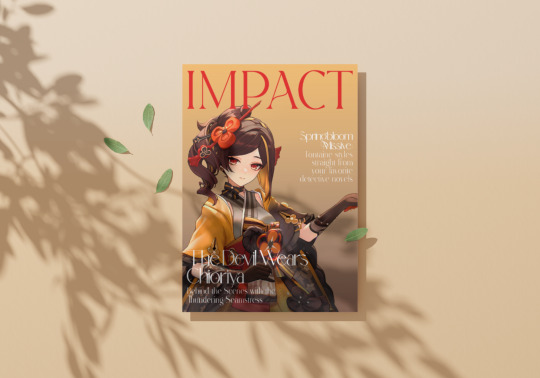
Teyvat Style: magazine mockups (1/?)
insp: 1 2
#chiori#genshinedit#genshinet#genshincreations#dailygaming#genshinimpactedit#thanks to leaks reddit for the banger headliner i havent been able to get it out of my head since#not my best work i think but eh whatever. good luck on your pulls everyone!!!!!!!!!!!#i want to do more of these but im so unused to editing people like how magazines and k(b)poppers do it#teyvat posts#genshin gfx#genshin impact gfx#genshin impact#genshin chiori#原神#genshin graphics#genshin edit#genshin edits#chiori edit#chiori gfx#ermmmmm also the text is kind of blurry imma die#id in alts
277 notes
·
View notes
Text



forgotten kirby facts 51 - in the 2018 nintendo dream june interview, kumazaki expanded on some information about hyness that was only lightly touched upon in the main game:hyness' worship began out of wanting for his clan to be saved from ending, but began to fall into obsession with worship quickly, neglecting the clan and deciding to seek revenge rather than their survival, additionally, it seems his corruption by the heart wasnt like previous cases of corruption, being more aware and willingly, and possibly from him never being much of a good person.
(from DREAM june 2018 interview, scans and translation r a courtesy of @desultory-novice , ty!)
#chose to bold out the possibly since kumazaki has mastered the arts of 'hmmmm i unnooo this could mean two thingsss'#so you guys do w all this what you want.anyways#this has been in my drafts since november second ! finally gets to go outside.so proud of it.sniff#forgotten kirby facts#kirby#kirby star allies#from magazine#from interview#hyness#2010s
64 notes
·
View notes
Text



RABBLE ROUSER MAG ISSUE 01
Alyona "Aon" Petrova
#tried to do a thing#will probably do some more of that thing with other characters#a fun way to try out some alternative styles for the blorbos#but barbie-dress-up magazine sounds a bit dumb lol#and graphic design is my passion (nicht) KEK#cyberpunk 2077#oc: aon#virtual photography#my ocs#anyone who finds a typo gets a price
61 notes
·
View notes
Text

Presenting EnSeason, a monthly release magazine featuring ES idols! This inaugural January issue is Trickstar following the announcement of their TRIP album :]
Image without text below the cut:

rendering got my ass on this one
#enstars#trickstar#hokuto hidaka#subaru akehoshi#makoto yuuki#mao isara#i've never drawn trickstar in any serious capacity (or at all probably) this one's for you trickstarPs o7#artist brain: oh you did so so good on the rendering#designer brain: why the fuck did you cover up the masthead (title) on issue one dumbass#i'll post more design notes later :]#school started so i'm working on that and was doing this at the same time sorry for inactivity#i've been super active on livelaughloverinky tho (me and bean's joint rinky blog go look)#this project's to get me drawing more than just. eden and bees all the time#and i've been wanting to do more magazine design#not 100% on this one but it's the first one it can change later so it's whaaaatever#this is a longterm project that i have mapped out so if you come at me with the 'you should do __' i'll be bugged. don't test me.#</lh but yeah jhgdfjlskdgfh#i wanna draw more units so i do a little something for every producer but this is first and foremost a me project so yeah#ideally?? shooting for midmonth releases but again i do have school so#enseason
152 notes
·
View notes
Text
Obsessed with people still acting like seungmin's getting special treatment because song by exists, despite the fact the format has been massively cut down so atp it's just a video of a live cover and... literally what does him making a live cover vid every couple of months have to do with div1 fumbling lee knows gucci deal? They also fumbled chan + givenchy and jeongin + Alexander mcqueen, unless somehow these are also seungmins fault.
Also div1 also fumbled seungmin + loewe so lmao
#its like the 1000th time ive seen a lee knower or a han person acting like seungmin ever getting any solo schedules is somehow ?#an attack on those two specifically? or theyre missing out bc of him and its just like.... him getting osts once a year#has nothing to do with them? theres not a special little booklet that says oh we can only let 1 stray kids do anything at a time#also again... changbin has gotten less than those guys but i never seen changbin fans being like This is all seungmins fault#like its so consistently lee know ppl and its just like okay i understand youre stupid but they arent actually divorced#and seungmin hasnt ever 'taken' anything from lee know#in fact hes the first to comment and compliment whenever lee know does anything so ???#seungmin has no brand deals he got 1 magazine last yr wheres the special treatment also again. bc of song cover videos ?????#lily nmixx has a lot of those too#actually pretty common in kpop#Its just funny like ive even seen felix akgaes and shit do this and its like ????? seungmin does not get many solo schedules ???#like 1 magazine last yr 1 fashion show and some song covers isnt actually a lot of stuff fellas#like youd think theyve given him a whole drama launch a solo album 60 magazine covers a house and a moat the way these people talk
35 notes
·
View notes
Text
scout tf2 yaoi fans, i use my encyclopedic knowledge of queer music to bring you: this verse from Pansy Division's Beercan Boy

use it wisely. or stupidly this is tf2
#team fortress 2#tf2 scout#tf2#meme crop#blog#i had sniperscout in mind just cuz its my fave but you can apply it to whatever ship you see fit#heavyscout would probably be the most accurate tbh lol#on a more serious queer music in tf2 note#i like to imagine spy figuring out that Scout is figuring out that hes into Boys#and getting a copy of the 1962 album Love is a Drag (For Adult Listeners Only)#(if you know you know)#(if you dont go google it. read the lore on queermusicheritage)#and sneaking it into scouts room or somewhere else he could Conveniently Stumble Upon It#yknow classic distant dad trying to be supportive move#and scout listens to it like 👁️👄👁️#ok last Historical Queer TF2 headcanon all the magazine in medics waiting room are ''Physique Magazines'' he has subscriptions to hkgfdssjk#he only puts out old editions he doesnt care about because he realized quickly that pyro likes to burn them#and some of them also just Mysteriously Disappear ;) (the other mercs steal them)
23 notes
·
View notes